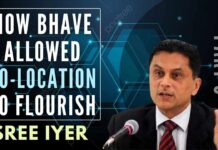
The 5 eyes, ears, and hands of P Chidambaram
The Indian Civil Service (ICS), renamed as Indian Administrative Service (IAS) after independence, is considered the ‘steel frame’ of India. To keep the federal state of India united, it was designed as an ‘All India Cadre‘. With the change in government, there are changes in the political executives, but the civil servants provide continuity with their longer service tenures.
Despite the control and supervision of the political executive, the civil servants are guaranteed safeguards under Article 311 of the Constitution of India against dismissal and demotion. The rationale for this provision was that the civil servants should act without fear or favour to uphold ‘rule of law’, rather than succumbing to the politically expedient whims and fancies of the bosses.
Civil servants are ‘public servants‘; therefore ‘Devotion to duty’ and ‘integrity’ are essential for the civil servants to be ‘public servants’ and become the impregnable ‘steel frame’ of India.[1]
Unfortunately, certain erstwhile political leaders have succeeded in making the steel frame malleable and replacing the devotion to ‘public’ duty by personal loyalty using carrot and stick policy — carrot of personal aggrandizement by sharing spoils and stick of transfer/ posting to remote locations or initiating departmental proceedings.
The Constitutional safeguards are of no avail if the civil servants lack integrity and devotion to duty, the attributes which cannot be imposed or enforced but must come from within.
Notable among such malleable bureaucrats are K P Krishnan, 1984 batch Karnataka cadre IAS officer, Ramesh Abhishek, 1982 batch Bihar cadre IAS officer, C B Bhave, 1975 batch Maharashtra cadre IAS officer, C K G Nair, 1985 batch ES officer, and M S Sahoo, 1985 batch IES officer.

These officers were known to be Eyes, Ears, and Hands of P Chidambaram and this has not changed despite the UPA Government and Chidambaram is no longer in power. They are like a sleeper cell in the current regime, who still work for and under the instruction of their old master, in return for favours in terms of lucrative postings – pre and post-retirement, preferred location, and preferred accommodation, etc.
Network of Chidambaram-loyalists infesting various branches of Governance
K P Krishnan
It is widely known in government circles that K P Krishnan had unflinching loyalty towards the then Finance Minister P Chidambaram.
Though Krishnan himself has retired on superannuation, his utility to Chidambaram has not diminished, as despite not being in service, the influence of Krishnan over present bureaucrats is phenomenal.[2]
Both P Chidambaram and Krishnan knew that their vested interests would be served better if Krishnan continued to be close to policy-making by donning the hypothetical clothes of political neutrality. This utility of Krishnan to Chidambaram was sustained by the openings given by Injeti Srinivas, the then Secretary of Ministry of Corporate Affairs to Krishnan.
Injeti Srinivas, who operated under the radar for Chidambaram showered favours to Krishnan when he, as the Secretary, Ministry of Corporate Affairs, selected Krishnan as the Investor Education and Protection Fund (lEPF) chair Professor at National Council of Applied Economic Research (NCAER). More importantly, Srinivas also appointed Krishnan as the chairman of the Cross-Border Insolvency Rules/ Regulation Committee (CBIRC). Later, as the Chairperson of IFSCA, Srinivas appointed Krishnan as an Honorary Senior Advisor.[3]
Krishnan, post superannuation not only has been taking up important positions in committees/ for an of the government or public bodies involving public policymaking but also has been on Boards of various private companies. This is a matter of conflict of interest as it would to a great extent benefit private companies in knowing the affairs of the Government to which they are not privy to.
Krishnan has joined Shriram Capital Limited, the holding company of Shriram Group as its Chairman despite he been working on various government-appointed committees/ fora.[4]
Krishnan while in service served as Joint and Additional Secretary, Department of Economic Affairs (DEA), Ministry of Finance. Notably, the Shriram group is associated with Finance, Insurance, and Financial Services which are all under the administrative control of the Ministry of Finance.
The perception of bureaucrats making policies either for a quid pro quo or a post-retirement job is dangerous for governance. There is certainly a need to ensure the post-retirement jobs of retired bureaucrats are not seen as “reward” for work done by them while in office.
Krishnan with his reach within bureaucrats and being close to Chidambaram is still occupying Government Accommodation (Type—VII Bungalow) even after his superannuation. The Directorate of Estates seems to have taken no steps to get the Govt. bungalow vacated which can be allotted to other eligible bureaucrats in service.
Ramesh Abhishek
There is no dearth of information as regards the crimes of Ramesh Abhishek. The first name that comes to mind in bureaucrat circles for corruption and abuse of official position is Ramesh Abhishek.
Abhishek, just like Krishnan has been favourite of Chidambaram. Back in 2013-14, Chidambaram gave him 5 extensions as Chairman of the Forward Markets Commission (FMC), which is unprecedented, even though there are no records on the DOPT website before the present government came in the power. Besides, during that time Chidambaram assisted Ramesh Abhishek to bypass Civil Services Rules of permissible limit for AS officers to stay outside State Cadre.[1]
Ramesh Abhishek chose to use the services and firm of his daughter Vaneesa Abhishek Agarwal for channelling the illegal funds acquired during and post-tenure. While he was Chairman FMC, he got his daughter Vaneesa, a law graduate inducted into SEBI. Vaneesa, after her brief stint in SEBI, opened a legal firm named ‘Thinking Legal’.
Ramesh Abhishek used to direct the brokers who were caught for non-compliance and illegalities, to ‘Thinking Legal’ to let them off the hook after paying a ‘fee’. Reportedly, Vaneesa’s firm also received legal consultancy fees (bogus) from Reliance Infrastructure (Reliance ADAG Group) and as a quid pro quo, Ramesh Abhishek recommended a grant of license to Reliance ADAG Group for setting up a commodity exchange.[5]
When Ramesh Abhishek was appointed as DPIlT Secretary in 2016, to have proximity Vaneesa opened a branch of ‘Thinking Legal‘ in Delhi. The firm started practicing consulting start-ups, intellectual property rights, and other matters which were directly dealt with by her father in his official capacity. Sanctions, permissions, approvals, and licenses were granted by Abhishek only after the proposals were informally ‘cleared’ by ‘Thinking Legal’.
Even Rothschild & Co. a company in Europe appointed Thinking Legal as an advisor for a whopping fee of Rs.2 crores. This seems to be illegal gratification to Ramesh Abhishek for clearing their proposal.[6]
Like Krishnan, Ramesh Abhishek has also been taking up a role in the Board of Private Companies which appears to be a quid pro quo arrangement with those companies.
Not surprisingly, post-retirement, like Krishnan, Ramesh Abhishek has been taking up Board positions in a string of companies. The most prominent being Cyient Ltd. which was the beneficiary of a license granted by Ramesh Abhishek while he was the Secretary, DPIIT, as a quid pro quo. Ramesh Abhishek has recently taken Directorship in three of the companies of the Edelweiss group.[7]
Even Ramesh Abhishek’s appointment to the board of directors of the US-India Business Council (USIBC) is equally controversial since he was appointed to lobby on behalf of certain US companies seeking investments in India against regulation of non-personal data.
Ramesh Abhishek, just like Krishnan did not vacate his Govt accommodation even after superannuation. Thanks to PIL activists who ensured that all those illegally occupying the government accommodations vacated it.
Two things come out clearly from these acts of favouritism in selections in Government positions and accommodations:
- Important posts in government and regulatory institutions are occupied by Chidambaram-loyalists through revolving door policy; there are entry barriers for others;
- These selections also act as carrots dangled to the loyalists in the government for keeping personal loyalty to Chidambaram above the call of duty.
Chandrakant B Bhave (C B Bhave)
C B Bhave was another professional chosen to carry out Chidambaram’s agenda. In February 2008, C B Bhave was appointed as the Chairman of SEBI for a period of three years by the then Finance Minister Chidambaram even though Bhave was not in the shortlisted candidates list of the Search Committee.
Chidambaram while selecting Bhave also ignored the fact that there was an obvious conflict of interest as Bhave was then Chairman & Managing Director of National Securities Depository Ltd (NSDL), a company promoted by the National Stock Exchange (NSE), which was facing investigation on the IPO Scam.[8]
As a major cover-up, Krishnan from Finance Ministry made claims that Bhave will be ring-fenced from the ongoing SEBI investigation in the NSDL IPO scam. Nevertheless, in spite of an adverse report submitted by a two-member Board-appointed Committee headed by Mohan Gopal implicating NSDL for the IPO scam, the SEBI Board under the Chairmanship of C B Bhave gave a clean chit to the NSDL in the IPO scam.[9]
Having joined SEBI from NSE-controlled NSDL, Bhave continued to have loyalty towards NSE. To favour NSE, Bhave denied approval to the Bombay Stock Exchange (BSE) to acquire Computer Age Management System (CAMS) without any authority, power, or jurisdiction under any law, rule, or regulations. It’s anyone’s guess as to why BSE was not granted approval to acquire CAMS, as later it was acquired by NSE and wherein NSE recently earned over Rs.2000 crores in the stake sale of CAMS.
The present-day colocation scam of NSE pertains to the initiation of a co-location facility by NSE when C B Bhave was SEBI Chairman.
C K G Nair
What creates a vested interest in the loyalists is, they see that the loyalists are handsomely rewarded. C K G Nair, a Chidambaram loyalist, was part of a formidable team of top-notch politicians, top bureaucrats, and academicians who were working in close coordination to protect and promote the monopoly of the National Stock Exchange (NSE) in the exchange space.
As a result, post-retirement, C K G Nair was appointed as Member, Securities Appellate Tribunal (SAT) by bypassing the normal process of inviting applications and conducting interviews and overlooking obvious conflict of interest for his closeness with the senior management at NSE including Ravi Narain, Chitra Ramakrishna and whose daughter was working in NSE.[10]
C K G Nair continued to hear the cases where NSE was a party to dispute. After his term at SAT had ended, he has been made Director at the National Institute of Securities Markets (NISM), promoted by the NSE. C K G Nair is still under the influence and moral obligation of Krishnan, with whom he had worked in the Ministry of Finance to protect the interest of NSE, to please their master.
M S Sahoo
Another loyalist, M S Sahoo from the Ministry of Finance was first sent on deputation to NSE and then made a Member of Securities and Exchange Board of India, which is an Additional Secretary level post. Sahoo was just a Director in the Ministry of Finance.
Chidambaram indirectly holds a stake in NSE and therefore has a personal interest in NSE. Therefore, Sahoo was first deputed to NSE before appointing him as Member, SEBI. Obviously, there was no question of Sahoo passing any strong orders against NSE.
Finally, Sahoo was appointed as Chairman of Insolvency and Bankruptcy Board of India (IBBI), a Secretary-level post, again bypassing the normal process of circulating the posting.[11]
Need of the hour
If India has to grow, bureaucrats serving personal interest must be kept at bay. A few moles of Chidambaram who have infiltrated the system have been identified above. The least that the present government, more specifically Smt. Nirmala Sitharaman, the current Finance Minister, can do is:
- Apply the precedent of periodical transfer to those presently under the serving term.
- Inquire why the process of inviting applications and conducting interviews was given a go-by in the past. Is it because of nepotism or there was no better candidate than the one who was selected? How did the authority come to that conclusion?
- Replace such loyalists from key positions.
- Prohibit retired bureaucrats who are appointed in any of the Govt. committees/forums to take up Board positions in private/ public enterprises. The guidelines in the nature of a Code of Conduct for retired Civil Servants should be formulated.
- Retired bureaucrats holding Govt. accommodation should be made to vacate the same, as per the accommodation rules of the Directorate of Estates
Reference:
[1] Why Civil Servants are called the Steel Frame of India? Explained – Jul 05, 2021, Jagran Josh
[2] Funding Chidambaram’s blue-eyed boys: Ramesh Abhishek, K P Krishnan – Dec 05, 2019, PGurus.com
[3] Injeti Srinivas appointed chairman of IFSCA – Jul 06, 2020, ET
[4] Krishnan has joined Shriram Capital Limited, the holding company of Shriram Group – Feb 22, 2020, Mint
[5] How Ramesh Abhishek Failed To Deliver On One Of GOI’s best initiatives, Startup India – Jul 20, 2019, PGurus.com
[6] Did Ramesh Abhishek use his contacts in Home Ministry to harass the suspected Whistleblower? – Jun 07, 2019, PGurus.com
[7] After abusing power by granting license to Cyient Ltd as DPIIT Secretary, retired Babu Ramesh Abhishek joins its Board – Aug 19, 2020, PGurus.com
[8] C-Company to The Market Mafia: The story of the Deep State of India’s financial markets – Jan 09, 2021, PGurus.com
[9] Corrupt officer joins the Global board of USIBC – Irony died a thousand deaths – Jul 22, 2020, PGurus.com
[10] Government appoints CKG Nair as Securities Appellate Tribunal member – Feb 18, 2016, ET
[11] M S Sahoo takes charge as Insolvency and Bankruptcy Board chief – Oct 01, 2015, BS
PGurus is now on Telegram. Click here to join our channel and stay updated with all the latest news and views
For all the latest updates, download PGurus App.
- Indian Parliament’s Special Session is convened to mark the shifting to new Parliament building - September 3, 2023
- Why did Rajat Sharma of India TV not declare that Adani owns more than 16% shares in his channel? - January 29, 2023
- Prannoy Roy to get Rs.605 crore from Adani as per Stock Exchange filing. Why is Income Tax not acting on Roys’ dues of over Rs.800 crore? - January 4, 2023











Sree ji what about Raghuram Rajan . Namo ji has the habit of not replacing babus